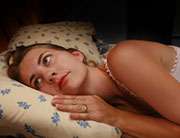(HealthDay)—For premenopausal women, sleep quality is associated with skin function and aging, according to a study presented at the International Investigative Dermatology meeting, held from May 8 to 11 in Edinburgh, U.K.
Patricia Oyetakin-White, M.D., from the University Hospitals Case Medical Center in Cleveland, and colleagues examined the effect of chronic poor sleep on skin aging and response to environmental/exogenous stressors in vivo. Participants included 60 premenopausal women aged 30 to 49 years, 30 of whom were good sleepers and 30 poor sleepers. Transepidermal water loss (TEWL), which was measured to assess the epidermal barrier function, was measured at baseline and 72 hours after tape stripping (TS), which disrupted the skin barrier. Intrinsic and extrinsic skin aging were also assessed.
The researchers found that the baseline TEWL was significantly higher in poor versus good sleepers. At 72-hours post TS, barrier recovery was significantly greater in good sleepers versus poor sleepers. Intrinsic aging scores were significantly lower among good versus poor sleepers; no significant difference was noted in the extrinsic aging scores. Compared with poor sleepers, good sleepers reported significantly more satisfaction with their appearance and physical attractiveness. In addition, good sleepers demonstrated more efficient recovery from erythema 48-hours after exposure to simulated solar radiation.
"This research shows, for the first time, that poor sleep quality can accelerate signs of skin aging and weaken the skin's ability to repair itself at night," a coauthor said in a statement.
The study was supported by a grant from Estée Lauder Companies; several authors disclosed being employed by Estée Lauder.
More information:
Press Release
More Information
Copyright © 2013 HealthDay. All rights reserved.


















